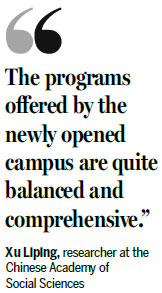Overseas campuses lead the charge in soft power push
By Hu Meidong in Xiamen and Zhao Xinying in Beijing (China Daily) Updated: 2016-02-26 08:06|
Students in class at Xiamen University Malaysia on Monday, its opening day. Zhang Wenzong / Xinhua |
Experts are predicting an increase in Chinese universities expanding overseas as the country extends the reach of its soft power.
Among the trend leaders is Xiamen University Malaysia, whose campus opened on Monday to welcome its first batch of more than 180 students.
The effort has been described as pioneering by Wang Huiyao, director of Beijing-based think tank Center for China and Globalization.
He encouraged more major Chinese universities to expand overseas in support of the country's growing economic clout.
Wang Ruifang, the Malaysia campus president, said enrollment had exceeded expectations as no more than 100 students were expected in the first batch.
It was a sign that the university has won recognition among local high school graduates and their parents, he said.
Courses available for the first batch of students include traditional Chinese medicine, Chinese studies, journalism, accounting, new energy science and engineering.

They will be taught in English and their degrees, which will be granted by the parent university in Xiamen, Fujian province, will be recognized by both the Chinese and Malaysian governments.
Xu Liping, a senior research fellow of Southeast Asia studies at the Chinese Academy of Social Sciences, praised the choice of courses available. "The programs offered by the newly opened campus are quite balanced and comprehensive, which I believe will help the campus to keep developing and expand its influence in the region," said Xu.
In recent years, some Chinese higher education institutions have been looking to cooperate with educational institutes overseas in a range of ways.
Beijing Language and Culture University set up a college in Tokyo, mainly offering degrees on language and culture, while Yunnan University of Finance and Economics has joined hands with Thailand's Rangsit University to set up the Bangkok Business School, providing six undergraduate and graduate programs on economics and administration.
Xu predicts a growing trend in China's higher education institutes heading overseas in the near future, with the Asia-Pacific region identified as a major destination.
However, Xu warned against expanding too rapidly without doing the proper research.
"Against such a backdrop, Chinese universities wishing to go overseas should be cautious about too quick of an expansion," said Xu. "Rather, they should take local needs into consideration and design programs and courses accordingly."
- Xi and Germany's Gauck promote new opportunities
- Identity stolen, woman deprived of campus life
- Emotions contribute most to sleep troubles
- China says any third party will not affect its ties with Cuba
- President Xi meets German counterpart on stronger ties
- Image makeover: Perception of govt officials needs new look
- $88m vaccine sales case triggers probe
- China's 'Tianqin' program starts infrastructure construction
- Students get into the swing for spring
- Blacklist urged to halt invasive species








